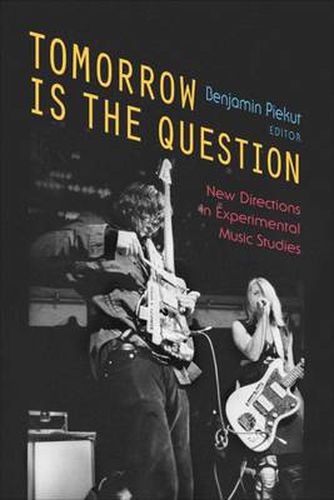Readings Newsletter
Become a Readings Member to make your shopping experience even easier.
Sign in or sign up for free!
You’re not far away from qualifying for FREE standard shipping within Australia
You’ve qualified for FREE standard shipping within Australia
The cart is loading…






In recent decades, experimental music has flourished outside of European and American concert halls. The principles of indeterminacy, improvisation, nonmusical sound, and noise, pioneered in concert and on paper by the likes of Henry Cowell, John Cage, and Ornette Coleman, can now be found in a variety of new locations: activist films, rock recordings, and public radio broadcasts, not to mention in avant-garde movements around the world.
The contributors to Tomorrow Is the Question explore these previously unexamined corners of experimental music history, considering topics such as Sonic Youth, Julius Eastman, the Downtown New York pop avant-garde of the 1970s, Fluxus composer Benjamin Patterson, Tokyo’s Music group (aka Group Ongaku), the Balinese avant-garde, the Leicester school of British experimentalists, Cuba’s Grupo de Experimentacion Sonora del ICAIC, Pauline Oliveros’s score for the feminist documentary Maquilapolis, NPR’s 1980s RadioVisions, and the philosophy of experimental musical aesthetics.
Taken together, this menagerie of people, places, and things makes up an experimentalism that is always partial, compromised, and invented in its local and particular formations-in other words, these individual cases suggest that experimentalism has been a far more variegated set of practices and discourses than previously recognised. Asking new questions leads to researching new materials, individuals, and contexts and, eventually, to the new critical paradigms that are necessary to interpret these new materials. Tomorrow Is the Question, gathering contributions from historical musicology, enthnomusicology, history, philosophy, and cultural studies, generates future research directions in experimental music studies by way of a productive inquiry that sustains and elaborates critical conversations.
$9.00 standard shipping within Australia
FREE standard shipping within Australia for orders over $100.00
Express & International shipping calculated at checkout
In recent decades, experimental music has flourished outside of European and American concert halls. The principles of indeterminacy, improvisation, nonmusical sound, and noise, pioneered in concert and on paper by the likes of Henry Cowell, John Cage, and Ornette Coleman, can now be found in a variety of new locations: activist films, rock recordings, and public radio broadcasts, not to mention in avant-garde movements around the world.
The contributors to Tomorrow Is the Question explore these previously unexamined corners of experimental music history, considering topics such as Sonic Youth, Julius Eastman, the Downtown New York pop avant-garde of the 1970s, Fluxus composer Benjamin Patterson, Tokyo’s Music group (aka Group Ongaku), the Balinese avant-garde, the Leicester school of British experimentalists, Cuba’s Grupo de Experimentacion Sonora del ICAIC, Pauline Oliveros’s score for the feminist documentary Maquilapolis, NPR’s 1980s RadioVisions, and the philosophy of experimental musical aesthetics.
Taken together, this menagerie of people, places, and things makes up an experimentalism that is always partial, compromised, and invented in its local and particular formations-in other words, these individual cases suggest that experimentalism has been a far more variegated set of practices and discourses than previously recognised. Asking new questions leads to researching new materials, individuals, and contexts and, eventually, to the new critical paradigms that are necessary to interpret these new materials. Tomorrow Is the Question, gathering contributions from historical musicology, enthnomusicology, history, philosophy, and cultural studies, generates future research directions in experimental music studies by way of a productive inquiry that sustains and elaborates critical conversations.